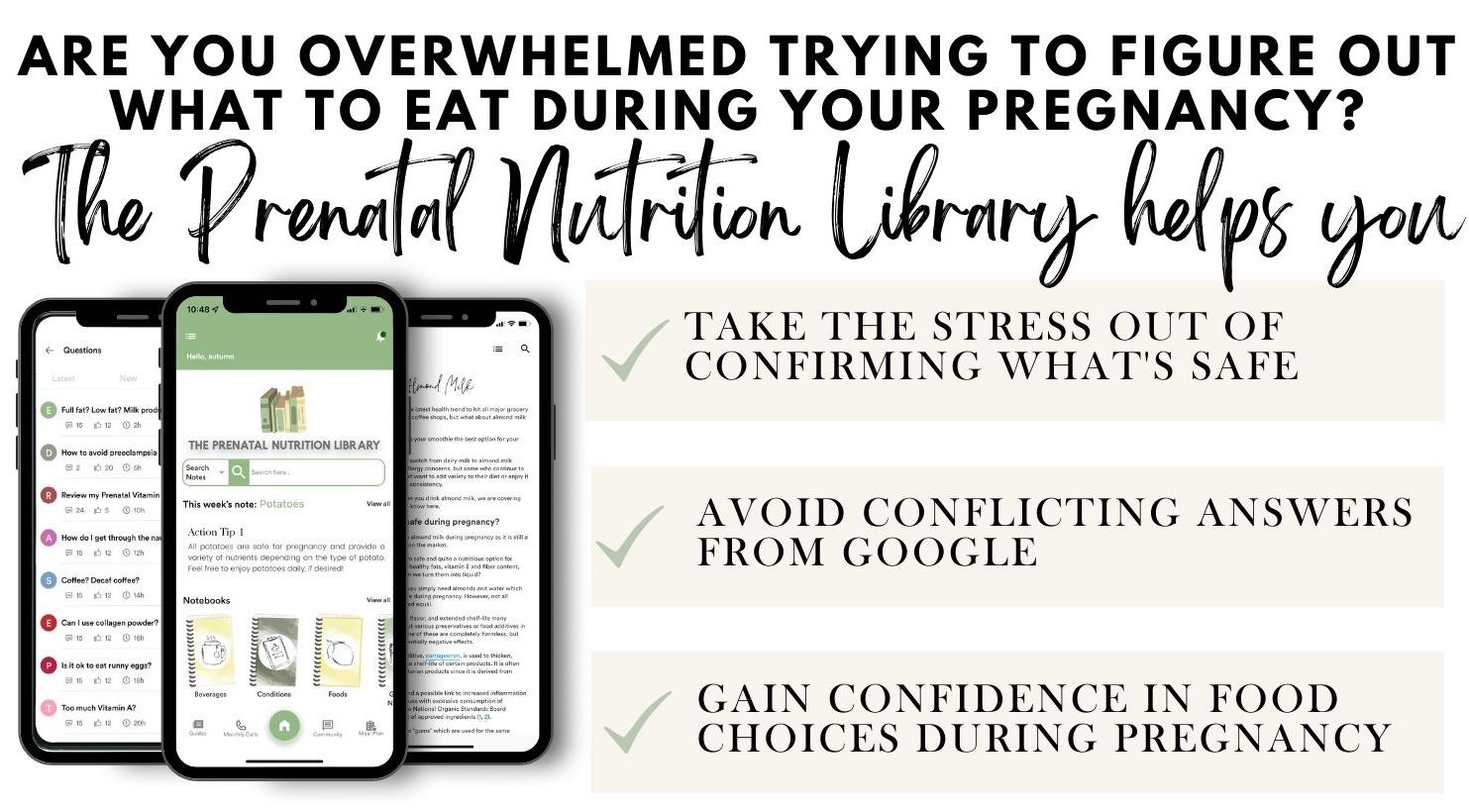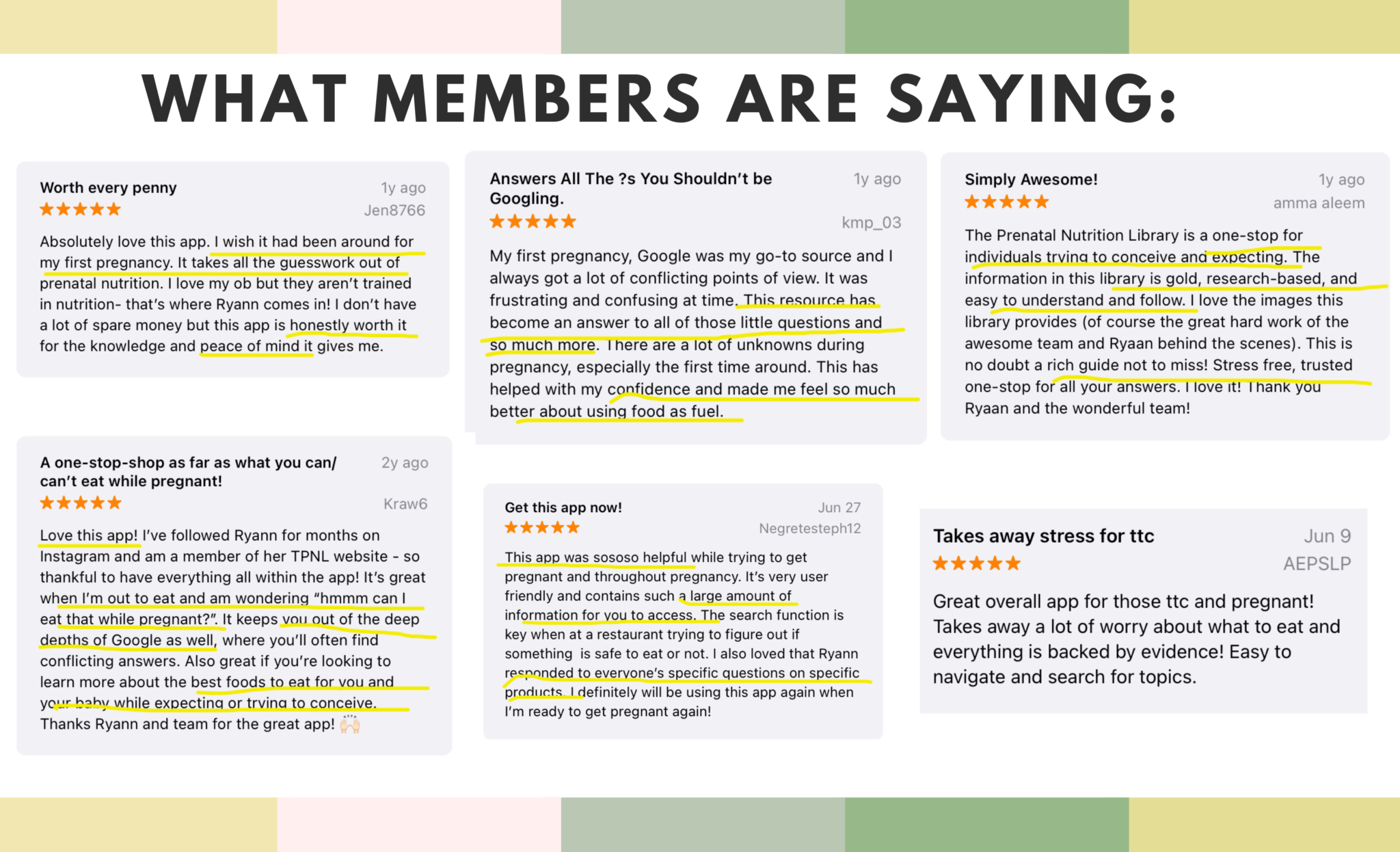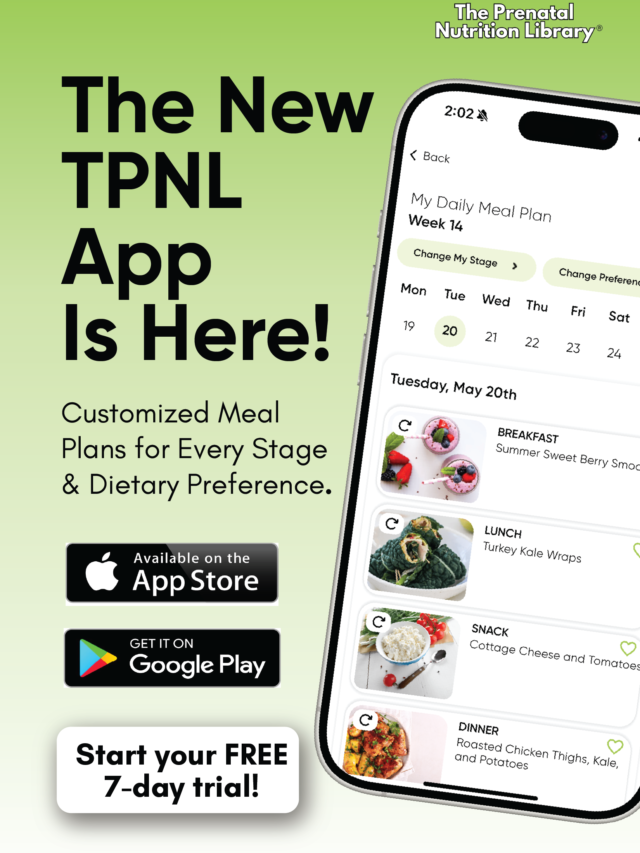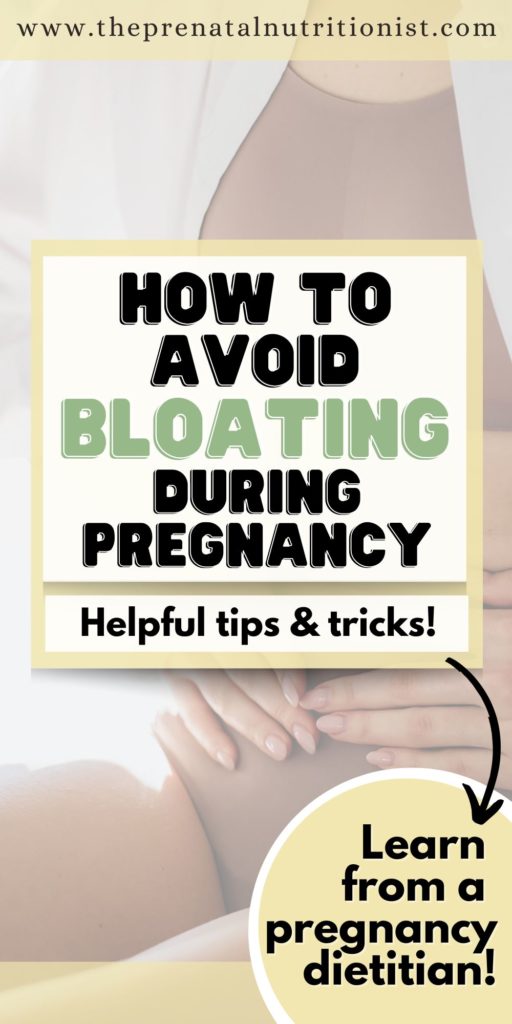
Pregnancy is a wonderful journey, but it can lead to uncomfortable side effects, like bloating and gas. Changes in digestion often occur during pregnancy due to hormone changes and baby taking up more physical space as pregnancy progresses. Bloating and gas are common during pregnancy and, for the most part, expected.
That doesn’t mean they aren’t uncomfortable symptoms. The good news? Nutrition can play a helpful role in the management of bloating and gas. This post will review possible causes, tips, and tricks for combating pregnancy gas and bloating.
This way, you can feel more comfortable and enjoy this beautiful phase of your life with your growing baby!
How To Avoid Bloating In Pregnancy: Tips and Tricks
While gas and bloating during pregnancy are really common (especially as an early pregnancy symptom), the good news is that there are plenty of strategies to help you both manage and prevent it. Everyone is different, so you may have to try several strategies to help.
Changes in hormone levels, especially the increase in progesterone, can relax the muscles in your digestive tract. This can lead to much slower digestion. The end result? Digestive symptoms like gas, bloating, and constipation. Additionally, your growing uterus and baby can put a lot of pressure on your intestines. This can worsen the feeling of fullness and discomfort.
There are several nutrition and lifestyle-related strategies you can try. For example, drinking enough glasses of water per day, adjusting your diet to incorporate small meals versus large meals, avoiding or reducing intake of fried foods, and adding some gentle movement or pregnancy-friendly exercise into your routine.
What Does Bloating Feel Like In Pregnancy?
Bloating during pregnancy can feel like an uncomfortable fullness or tightness in your abdomen. It’s often described as feeling heavy and swollen. Bloating can occur during any trimester, including during early pregnancy. It’s generally worse in the evening hours or after a heavy meal.
Bloating is often accompanied by gas or flatulence. This can also be caused by increased uterine pressure, hormone changes, and slowing of the digestive system. When food moves slowly through the digestive tract, it allows gut bacteria more time to ferment undigested food and produce gas.
Overall, you will likely feel discomfort and notice feelings of fullness. However, bloating will feel and look different to everybody.
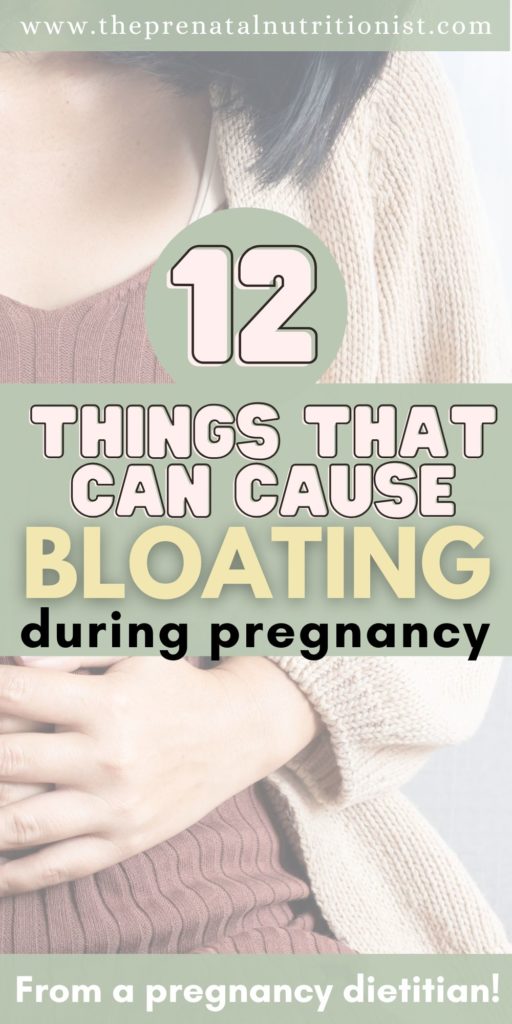
What Causes Bloating In Pregnancy:
- Pregnancy Hormones: Increased progesterone occurs during pregnancy, which can relax your digestive muscles, leading to slower digestion and more gas.
- Constipation: Hormonal changes and pressure from a growing fetus can have a huge impact on bowel movements, slowing them and causing constipation.
- Trigger Foods: Certain foods that didn’t affect you before may affect you during pregnancy, causing increased gas and bloating.
- Underlying GI Conditions: Conditions like Irritable Bowel Syndrome (IBS), Inflammatory Bowel Disease (IBD), Crohn’s disease, and Celiac disease can cause bloating during and outside pregnancy.
- Dehydration: Dehydration can cause constipation, leading to bloating. Make sure you drink plenty of water!
- Increased Fluid Retention: Pregnancy can lead to fluid retention, increasing the chances of feeling bloated and swollen.
- Dietary Changes: Increased appetite, food preference changes, and other dietary changes like lower fiber consumption may lead to gas and bloating.
- Swallowing Air: When you swallow air while eating, drinking, or even chewing gum, you increase your chances of bloating. Carbonated soft drinks can also cause this.
- Reduced Physical Activity: A reduction in your usual exercise can affect digestion and increase the chances of bloating.
- Growing Uterus: As your baby and uterus grow, this can pressure your intestines and stomach, causing you to feel bloated and full quickly.
- Stress and Anxiety: Emotions like stress and anxiety can impact digestion, causing bloating.
- Overeating: Eating too much can cause you to feel bloated.
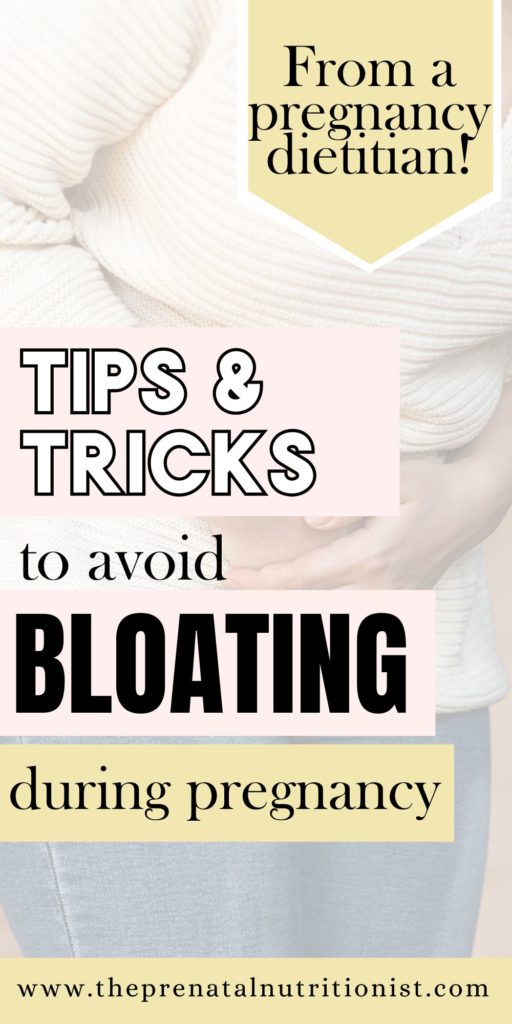
How To Prevent Bloating In Pregnancy
Keep a diary to identify food triggers.
Keeping a food diary with the foods you’re eating and the onset of symptoms may help you to identify triggers and foods that contribute to gas and bloating. By recording what you eat for a short period, you may be able to identify what foods are causing you to feel bloated and full.
Eat high-fiber foods.
High-fiber foods are the key to keeping things moving in your digestive system. Eating plenty of fiber, alongside plenty of fluids, can help prevent constipation. Constipation is a very common cause of bloating. Opt for whole grains, beans, fruits, legumes, and vegetables to increase your fiber intake.
Stay hydrated.
Staying hydrated is important for many reasons, including to help combat constipation and prevent bloating. Fluids help to keep things moving in your body. It can also aid in reducing water retention, which can contribute to feeling bloated.
Eat probiotic-rich foods.
Probiotics are helpful bacteria that support healthy gut flora, aiding in digestion. Add probiotic-rich food into your diet by including things like sauerkraut, yogurt, and kefir. Yogurt is good for pregnancy, easy to incorporate, and delicious. Be sure to introduce fermented foods into your diet slowly if you’re not used to eating them to avoid exacerbating bloating and gas.
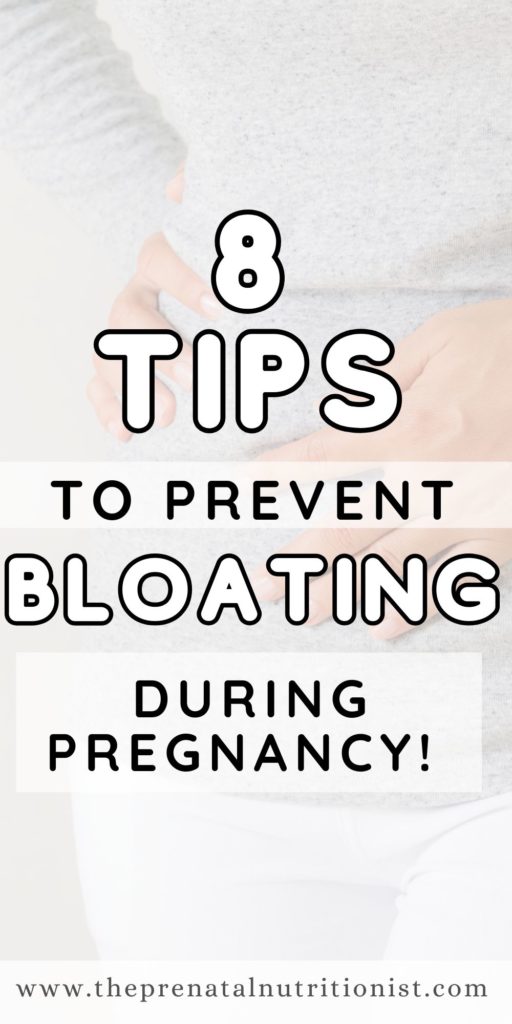
Walk and move often.
Regularly getting up to walk or incorporate gentle movement is good for digestion and combating bloating. Try to walk daily or get up occasionally and walk around the house. Doing a post-meal walk, especially after your most problematic meal, can make a big difference in reducing bloating.
Avoid soft drinks.
While soft drinks are a common craving, carbonated drinks are best avoided during pregnancy if you’re having trouble with bloating. They introduce excess gas into your system, increasing the chances of feeling bloated. Instead, check out our list of the best drinks for early pregnancy that are still delicious but carry a lesser chance of causing bloat.
Manage your stress.
While we know it’s easier said than done, keeping your stress levels at a minimum can reduce your chances of bloating. Try out deep breathing exercises, meditation, or prenatal massage to keep yourself calm and relaxed. It’s impossible to eliminate all stressors, but we can do our best to implement some management strategies and reduce stress when possible.
Eat smaller, more frequent meals.
Instead of having three large meals daily, opt for smaller meals more often. This can help prevent feeling overly full and bloated after a meal. It is also a good strategy to try if you’re battling pregnancy heartburn or nausea.
Beat the bloat during pregnancy with nutrition and lifestyle tips from above!
Do you often feel bloated during pregnancy? It’s an unpleasant but common and generally normal symptom of pregnancy. If you’re battling bloating, try some of the strategies above. Many times, addressing constipation can also help with both gas and bloating.
Need help planning nutritious (and delicious) meals for pregnancy? Download my FREE One-Week Meal Plan to keep you on track, fuelled with healthy meals, and meeting nutrient needs during your pregnancy.
Then, join The Prenatal Nutrition Library (TPNL) app for more strategies to combat bloating during pregnancy. You’ll also find guides on hundreds of other prenatal nutrition topics, including specific foods, symptoms, and supplements. TPNL is here to help you take the stress out of eating during pregnancy!



